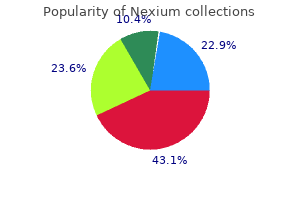"Buy genuine nexium line, gastritis unusual symptoms".
By: G. Gelford, M.B.A., M.D.
Co-Director, University of Nevada, Las Vegas School of Medicine
Biofeedback is a technique by which patients can bring involuntary bodily activity gastritis vs pud discount nexium line, such as heart rate or muscle tension gastritis and celiac diet buy generic nexium 40 mg on-line, under voluntary control gastritis diet recipes buy generic nexium 20mg on-line. Biofeedback training sessions require the patient to monitor the targeted bodily activity and gastritis symptoms blood order nexium 20 mg with visa, through trial and error, discover how to modify this activity. Neurosurgery, usually considered a treatment of last resort, is sometimes used to modify brain structures that contribute to severe disorders in cases where other treatments have not been effective. Biomedical treatments used with adults may need to be modified for use with children or elderly patients. Treatments that target psychological factors specifically focus on mental processes, mental contents, affect, and behaviors (see Table 4. These treatments differ in the specific psychological factors that they target, their goals, and the methods used. However, when successful, all of these treatments affect mental processes, mental contents, affect, and behaviors. Freud promoted psychic determinism, the theory that all behavior, no matter how minor (except for biological functions), has underlying psychological causes. The drives are restrained and regulated by the superego, which houses the internalized morals of society and the family. Freud held that psychological problems arise in large part from conflicts among the urges of the id and from the regulatory actions of the superego and ego. Rather than treating such problems medically-with medications or medical procedures, as was done in Europe at the end of the 19th century-Freud treated patients by having them talk about their problems and trying to discern the unconscious causes of the problems. The ultimate goal of psychoanalysis is to help patients manage impulses and urges more adaptively. To attain this end, the patient tries to: (1) understand the events in his or her past (especially interactions with his or her parents), and (2) understand how those events and his or her unconscious urges influence current difficulties. The theory holds that once patients become aware of the unconscious urges that are creating problems, they will be capable of more adaptively handling impulses arising from those urges. That is, when patients have attained sufficient insight into their problems, they can make more satisfying and productive choices; insight, according to proponents of psychodynamic therapy, is the main catalyst of change. Psychoanalysis is time-consuming and expensive (and rarely covered by health insurance plans). Patients meet with their psychoanalyst (a therapist who provides psychoanalysis) four or five times per week, and the average patient participates in 835 sessions over at least 4 years (Voth & Orth, 1973). Psychoanalysis is difficult to study scientifically because each patient receives a unique course of treatment (tailored to his or her own personal issues) over a long period of time. Nevertheless, the available studies have not usually found this treatment to be effective for many disorders. Psychoanalysis is less common today than in previous decades because of the time and cost involved and its uncertain benefits. Very brief forms of this less intensive treatment can consist of as few as 12 to 20 sessions (Bloom, 1997; Malan, 1976; Sifneos, 1992). Both psychoanalysis and psychodynamic therapy are designed to help patients understand that their unconscious motivations influence their behavior in specific ways and to help them make better choices. According to Freud, however, such treatment is not a cure, but a method for transforming deep misery into mundane unhappiness. The Therapeutic Alliance Both psychoanalysis and psychodynamic therapy emphasize the importance of a therapeutic alliance, the positive relationship between the therapist and the patient (Greenberg & Mitchell, 1983; Klein, 1932; Kohut, 1977; Sullivan, 1953; Winnicott, 1958). This patient-therapist collaboration, a social factor, provides the trust and good will needed to undertake the challenging work of the therapy. The therapeutic alliance also can supply patients with a corrective emotional experience, an opportunity to work through past unresolved experiences in a safe environment with the therapist (Alexander & French, 1946). The therapist also uses interpretation when a patient makes a speech error, such as saying "father" instead of "bother"; such errors are thought to be laden with meaning and are often called Freudian slips. According to Freud, interpretation should help the patient become aware of his or her unconscious conflicts. Freud N P S Therapeutic alliance the positive relationship between the therapist and the patient. Resistance is most likely to arise when disturbing or painful memories or thoughts come into consciousness.

Research findings are not the sole factor that should be considered when treatments are selected gastritis symptoms toddler order nexium. The suggestions we make here refer only to the "research findings" component of evidence-based practice and should be only one factor considered when selecting treatments gastritis icd 10 generic nexium 20mg visa. We recommend the decision-making team give serious consideration to these treatments because these treatments have produced beneficial effects for individuals involved in the research studies published in the scientific literature diet for gastritis patients order nexium 40 mg visa, access to treatments that work can be expected to produce more positive long-term outcomes gastritis lettuce order nexium 40 mg otc, and there is no evidence of harmful effects. However, it should not be assumed that these treatments will universally produce favorable outcomes for all individuals on the autism spectrum. Given the limited research support for Emerging Treatments, we generally do not recommend beginning with these treatments. However, Emerging Treatments should be considered promising and warrant serious consideration if Established Treatments are deemed inappropriate by the decision-making team. There are several very legitimate reasons this might be the case (see examples in the Professional Judgment or Values and Preferences sections of Chapter 5). When this is the case, decision-makers simply do not know if this treatment is effective, ineffective, or harmful because researchers have not conducted any or enough high quality research. These recommendations should be considered along with other sources of critical information when selecting treatments (see Chapter 5). National Standards Project { 26 5 Evidence-based Practice One of the primary objectives of this document is to identify evidence-based treatments. The National Standards Project is a natural extension of the efforts of the National Research Council , the New York State Department of Health, Early Intervention Division , and other related documents produced at state and national levels. Knowing which treatments have sufficient evidence of effectiveness is likely to - and should - influence treatment selection. Evidence-based practice, however, is more complicated than simply knowing which treatments are effective. Although we argue that knowing which treatments have evidence of effectiveness is essential, other critical factors must also be taken into consideration. We have identified the following four factors of evidence-based practice: Research Findings. The strength of evidence ratings for all treatments being considered must be known. Serious consideration should be given to Established Treatments because there is sufficient evidence that the treatment produced beneficial effects and they are not associated with unfavorable outcomes. Ideally, treatment selection decisions should involve discussing the benefits of various Established Treatments. Despite the fact there is compelling evidence to suggest these treatments generally produce beneficial effects for individuals on the autism spectrum, there are reasons alternative treatments. Once treatments are selected, these professionals have the responsibility to collect data to determine if a treatment is effective. Professional judgment may play a particularly important role in decision-making when: A treatment has been correctly implemented in the past and was not effective or had harmful side effects. The professional may be aware of well-controlled studies that support the effectiveness of a treatment that were not available when the National Standards Project terminated its literature search. Stakeholder values and preference may play a particularly important role in decision-making when: A treatment has been correctly implemented in the past and was not effective or had harmful side effects. Treatment providers should be well positioned to correctly implement the intervention. Developing capacity and sustainability may take a great deal of time and effort, but all people involved in treatment should have proper training, adequate resources, and ongoing feedback about treatment fidelity. Capacity may play a particularly important role in decisionmaking when: A service delivery system has never implemented the intervention before. Many of these treatments are very complex and require precise use of techniques that can only be developed over time. A professional is considered the "local expert" for a given treatment but he or she actually has limited formal training in the technique.

The annual conference treasurer shall send the remaining 30 percent monthly to the treasurer of the General Council on Finance and Administration to be forwarded to the General Board of Discipleship chronic gastritis message boards cheap nexium master card, Division on Ministries With Young People high fiber diet gastritis discount nexium generic. All other Youth Service Fund money raised in the annual conference shall be divided in the same manner and distributed in the same way gastritis diet ��������� purchase nexium paypal. Project Review-The youth network of the Division on Ministries With Young People shall constitute a project review committee to advise the network in the selection of projects chronic gastritis nexium order nexium canada. The project review committee shall be comprised of youth and adult worker members of the Division on Ministries With Young People in a ratio of at least five youth to one adult as determined by the Division on Ministries With Young People. The projects shall be chosen according to the policies and criteria established by the youth network of the Division on Ministries With Young People. A minimum of 70 percent of the general portion of the Youth Service Fund shall be used to fund Youth Service Fund projects; the remaining amount shall be used for office resourcing and Youth Service Fund promotion and interpretation. United Methodist Communications shall assist the Division on Ministries With Young People in the promotion and interpretation of the Youth Service Fund. Grants for Ministries With Young People-There shall be grants made available to local churches, affiliated organizations, campus ministries, districts, annual conferences, provisional conferences, jurisdictional conferences, and central conferences of the United Methodist Church. Purpose-The purpose of these grants is to fund dynamic, creative ministries with young people that can serve as model programs for other organizations throughout the connection. Project Review-The Division on Ministries With Young People shall constitute a project review committee made up of three youth, three young adults, and three adult workers with young people who are members of the division. The Division on Ministries With Young People shall establish criteria in consultation with the four participating program boards and in relation to the purposes of the division and the program boards. Legislation-During the convocation there shall be opportunities for jurisdiction and central conference delegations and individuals to propose legislation in an appropriate forum. It is strongly recommended that jurisdictions, central conferences, and annual conference councils on youth and young-adult ministries, or equivalent structures, secure funding for Convocation participants who are elected from said conference. A limited amount of need-based scholarships shall be made available through the Division on Ministries With Young People to promote the full participation of the body. The Division on Ministries With Young People shall have as its chief staff officer an Associate General Secretary. This staff officer shall be nominated by the personnel committee of the General Board of Discipleship for election by the board. The search committee shall be chaired by the General Secretary of the General Board of Discipleship and composed of equal representation from the General Board of Discipleship and the Division on Ministries With Young People. All other staff members of the division will be elected or appointed in a manner prescribed by the board (¶ 714). There shall be a General Board of Global Ministries, hereinafter referred to as the board, the purpose of which is found within the expression of the total mission of the Church. It is a missional instrument of the United Methodist Church, its annual conferences, missionary conferences, and local congregations in the context of a global setting. Confesses by word and deed the redeeming activity of God in Christ among the whole human family; 3. Seeks to embody and realize the potential of new life in Christ among all human beings; and 4. To discern those places where the gospel has not been heard or heeded and to witness to its meaning throughout the world, inviting all persons to newness of life in Jesus Christ through a program of global ministries. To encourage and support the development of leadership in mission for both the Church and society. To challenge all United Methodists with the New Testament imperative to proclaim the gospel to the ends of the earth, expressing the mission of the Church; and to recruit, send, and receive missionaries, enabling them to dedicate all or a portion of their lives in service across racial, cultural, national, and political boundaries. To plan with others and to establish and strengthen Christian congregations where opportunities and needs are found, so that these congregations may be units of mission in their places and partners with others in the worldwide mission of the Christian church. To engage in dialogue with all persons, including those of other faiths, and to join with them where possible in action on common concerns. To assist local congregations and annual conferences in mission both in their own communities and across the globe by raising awareness of the claims of global mission and by providing channels for participation.


Expiration of Terms in Central Conferences-In a central conference where term episcopacy prevails gastritis symptoms heartburn purchase nexium with a visa, bishops whose term of office expires prior to the time of compulsory retirement because of age and who are not reelected by the central conference shall be returned to membership as traveling elders in the annual conference (or its successor) of which they ceased to be a member when elected bishop gastritis upper right abdominal pain buy nexium once a day. The credentials of office as bishop shall be submitted to the secretary of the central conference gastritis differential diagnosis effective 20mg nexium, who shall make thereon the notation that the bishop has honorably completed the term of service for which elected and has ceased to be a bishop of the United Methodist Church gastritis symptoms on dogs purchase nexium 20 mg without prescription. Review and Evaluation of Bishops-In its review of the work, character, and official administration of the bishops under ¶ 524. Such processes shall include the participation of the conference or area committee on episcopacy. Episcopal leadership in the United Methodist Church shares with all other ordained persons in the sacred trust of their ordination. The ministry of bishops as set forth in the Book of Discipline of the United Methodist Church also flows from the gospel as taught by Jesus the Christ and proclaimed by his apostles (¶ 402). Whenever a bishop violates this trust or is unable to fulfill appropriate responsibilities, continuation in the episcopal office shall be subject to review. Any complaint concerning the effectiveness, competence, or one or more of the offenses listed in ¶ 2702 shall be submitted to the president of the College of Bishops in that jurisdictional or central conference. If the complaint concerns the president, it shall be submitted to the secretary of the College of Bishops. The supervisory response should be carried out in a confidential manner and should be completed within 120 days. There may be an extension of 120 days if the supervising bishop and the two jurisdictional or central conference episcopacy committee members appointed to the supervisory process shall determine that an extension will be productive. There may be a second extension of 120 days by the mutual written consent of the supervisory bishop, members of the jurisdictional or central conference episcopacy committee appointed to the supervisory process, the complainant, and the bishop under complaint. The supervising bishop shall regularly advise all parties of the status of the process and shall notify all parties within seven days after a determination is made that the supervisory response will not lead to a resolution of the matter. No verbatim record shall be made and legal counsel shall not be present, although the bishop against whom the complaint was made and the complainant both may choose another person to accompany him or her, with the right to voice. If resolution is achieved, a written statement of resolution, including terms and conditions, shall be signed by the parties and the parties shall agree on any matters to be disclosed to third parties. Such written statement of resolution shall be given to the person in charge of that stage of the process for further action consistent with the agreement. When the jurisdictional or central conference committee on episcopacy deems the matter serious enough and when one or more offenses listed in ¶ 2702 are involved, the committee may refer the complaint back to the president and secretary of the College of Bishops (or the two members of the college who are handling the complaint) for referral as a judicial complaint to the jurisdictional or central conference committee on investigation. Any actions of the jurisdictional or central conference committee taken on a complaint shall be reported to the next session of the jurisdictional or central conference. Each jurisdiction shall develop a protocol for the caring of lay, clergy, and staff determined to be affected by the processing of the complaint. To lead and oversee the spiritual and temporal affairs of the United Methodist Church which confesses Jesus Christ as Lord and Savior, and particularly to lead the Church in its mission of witness and service in the world. To strengthen the local church, giving spiritual leadership to both laity and clergy; and to build relationships with people of local congregations of the area. To guard, transmit, teach, and proclaim, corporately and individually, the apostolic faith as it is expressed in Scripture and tradition, and, as they are led and endowed by the Spirit, to interpret that faith evangelically and prophetically. To travel through the connection at large as the Council of Bishops (¶ 422) to implement strategy for the concerns of the Church. To provide liaison and leadership in the quest for Christian unity in ministry, mission, and structure and in the search for strengthened relationships with other living faith communities. To organize such missions as shall have been authorized by the General Conference. To convene the Order of Deacons and the Order of Elders and work with the elected chairperson of each order. To promote, support, and model generous Christian giving, with special attention to teaching the biblical principles of giving. To provide general oversight for the fiscal and program operations of the annual conference(s). This may include special inquiry into the work of agencies to ensure that the annual conference and general church policies and procedures are followed. To ensure fair process for clergy and laity as set forth in ¶ 2701 in all involuntary administrative and judicial proceedings through monitoring the performance of annual conference officials, boards, and committees charged with implementing such procedures.

It is sufficiently clear for the purposes of this discussion that gastritis symptoms lower back pain buy nexium master card, as used in everyday language gastritis diet quizzes cheapest nexium, confirmation connotes evidence that is perceived to support-to increase the credibility of-a hypothesis gastritis diet ��� order nexium with visa. I also make a distinction between what might be called motivated and unmotivated forms of confirmation bias gastritis diet natural remedies buy nexium master card. People may treat evidence in a biased way when they are motivated by the desire to defend beliefs that they wish to maintain. The former case is easier to understand in commonsense terms than the latter because one can appreciate the tendency to treat evidence selectively when a valued belief is at risk. But it is less apparent why people should be partial in their uses of evidence when they are indifferent to the answer to a question in hand. An adequate account of the confirmation bias must encompass both cases because the existence of each is well documented. There are, of course, instances of one wishing to disconfirm a particular hypothesis. If, for example, one believes a hypothesis to be untrue, one may seek evidence of that fact or give undue weight to such evidence. A Long-Recognized Phenomenon Motivated confirmation bias has long been believed by philosophers to be an important determinant of thought and behavior. Francis Bacon (1620/1939) had this to say about it, for example: the human understanding when it has once adopted an opinion (either as being the received opinion or as being agreeable to itself) draws all things else to support and agree with it. And though there be a greater number and weight of instances to be found on the other side, yet these it either neglects and despises, or else by some distinction sets aside and rejects; in order that by this great and pernicious predetermination the authority of its former conclusions may remain inviolate. And such is the way of all superstitions, whether in astrology, dreams, omens, divine judgments, or the like; wherein men, having a delight in such vanities, mark the events where they are fulfilled, but where they fail, although this happened much oftener, neglect and pass them by. The idea that people are prone to treat evidence in biased ways if the issue in question matters to them is an old one among psychologists also: If we have nothing personally at stake in a dispute between people who are strangers to us, we are remarkably intelligent about weighing the evidence and in reaching a rational conclusion. We can be convinced in favor of either of the fighting parties on the basis of good evidence. But let the fight be our own, or let our own friends, relatives, fraternity brothers, be parties to the fight, and we lose our ability to see any other side of the issue than our own. The more urgent the impulse, or the closer it comes to the maintenance of our own selves, the more difficult it becomes to be rational and intelligent. They are difficult to reconcile, however, with the view that evidence is treated in a totally unbiased way if only one has no personal interest in that to which it pertains. The following discussion of this widely recognized bias is organized in four major sections. In the first, I review experimental evidence of the operation of a confirmation bias. The third section notes possible theoretical explanations of the bias that various researchers have proposed. The fourth addresses the question of the effects of the confirmation bias and whether it serves any useful purposes. Experimental Studies A great deal of empirical evidence supports the idea that the confirmation bias is extensive and strong and that it appears in many guises. Hypothesis-Determined Information Seeking and Interpretation People tend to seek information that they consider supportive of favored hypotheses or existing beliefs and to interpret information in ways that are partial to those hypotheses or beliefs. Conversely, they tend not to seek and perhaps even to avoid information that would be considered counterindicative with respect to those hypotheses or beliefs and supportive of alternative possibilities (Koriat, Lichtenstein, & Fischhoff, 1980). Beyond seeking information that is supportive of an existing hypothesis or belief, it appears that people often tend to seek only, or primarily, information that will support that hypothesis or belief in a particular way. This qualification is necessary because it is generally found that people seek a specific type of information that they would expect to find, assuming the hypothesis is true. Also, they sometimes appear to give weight to information that is consistent with a hypothesis but not diagnostic with respect to it. These generalizations are illustrated by several of the following experimental findings. If one entertains only a single possible explanation of some event or phenomenon, one precludes the possibility of interpreting data as supportive of any alternative explanation.
Discount nexium 40mg on line. What is an Esophagitis Diet.


